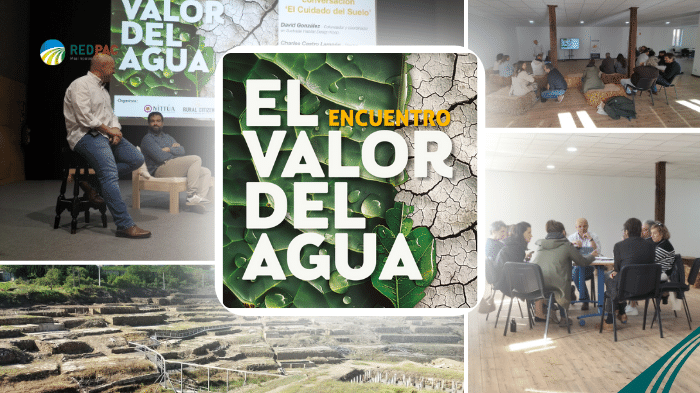
31 de May de 2024
The PAC Network collaborated in the celebration of the "Value of Water" conference on May 23 and 24 in the town of Zuhatzu-Kuartango (Álava).
- The PAC Network collaborated in this event held in the Alava town of Zuhatzu-Kuartango
- Experts, professionals, businessmen and interested agents have been able to debate about issues related to the possible generation of a land market
- The conversations make one point clear: soil care is essential to protecting water resources.
In times of climate change, the interdependence between water and soil is crucial. Both elements form a vital cycle that captures CO2 , conserves biodiversity, and ensures water supply. Protecting soils is essential to reversing water scarcity, boosting local economies, and maintaining agricultural, livestock, and forest lands.
To address these challenges, the PAC Network collaborated on the "Value of Water" conference held on May 23 and 24 in Zuhatzu-Kuartango (Álava). Organized by Rural Citizen and Nittúa , the event brought together professionals, experts, and stakeholders from the agricultural, rural, and business sectors to reflect on sustainable agricultural land management and water protection.
Towards a water market?
The event began with the goal of sharing innovative projects, reflecting on and finding possible solutions for water resource management, while also exploring management and certification methods that promote economic returns for those professionals who care for the soil.
A presentation video introduced this topic with a best practice originating in the Mexican state of Querétaro , where a certification seal was designed so that companies that exceeded the established emissions limit (50,000 tons of CO2 ) would have to pay a tax. The revenue is then used to benefit the same territory and its conservation.
Taking the project as a reference, Iván del Caz, director of Rural Citizen, held a conversation about the project "Soil Water" with its promoter Raúl Contreras , co-founder of the social change initiative Rural Nittúa . The PAC Network had the opportunity to talk and interview Contreras, who defends the social and environmental possibilities that come from soil care providing a financial return for agricultural professionals.
Discussions on soil care included David González, co-founder and coordinator of Sustraiak ; Charles Castro Lampón, director of Evaluation and Measurement of Social Impact at Ecodes ; Jaime Uria, researcher at the Basque Institute for Agricultural Research and Development ( NEIKER ); and José Luis Mañez Martínez, representative of the PAC Network, theTerritorial Antenna of the Basque Country and Navarre. The latter also gave a presentation on the Network's activities and functions.
Establishing dialogue
Later in the afternoon, PepsiCo 's Head of Sustainability for Southwest Europe, María Leiva, presented a project to plant 2,000 trees and shrubs in Las Torres de Cotillas. She spoke about the responsibility and potential of large companies to offset their water use through resource recovery projects.
To conclude the day and draw some conclusions strengthened by all the background information provided, attendees divided into several working groups. These groups included participatory activities on three topics:
- Soil Care: To position soil care as an effective and efficient way to increase water supply in groundwater aquifers.
- Opening the water market: regarding the possibility of creating strategies to implement the soil care market. The initial stage of the process was thus discussed, with the focus on choosing an economic sector in which to conduct the first operations with economic returns.
- Water Certification: The responsibilities for certifying water infiltration were discussed, as well as evaluating certification options that do not incur a cost for the producer of that value.
Following the group discussions, the attendees met to present a series of joint conclusions on each topic. Key points included the difficulty of establishing certification systems today, the potential for establishing a water market for agricultural professionals, and the need to clearly establish whether private actors should be involved or whether governments should be solely responsible for facilitating and verifying certifications.
Participants drew comparisons between the current CO2 market and a potential water market, seeking to avoid the mistakes made in both markets while replicating their positive results to minimize impacts. They also emphasized the critical need to prevent any of these activities from falling prey to whitewashing strategies.
Añana Salt Flats
The event concluded the following day with a visit to the Añana Salt Mine in the Salt Valley, the oldest active salt factory in the world. There, attendees enjoyed a guided tour of this site, which is an example of sustainable management and diversification of activities, with controlled salt production and extraction, sightseeing tours, workshops, and other activities aimed at protecting and highlighting the local heritage.
The full video of the event is available on YouTube .











